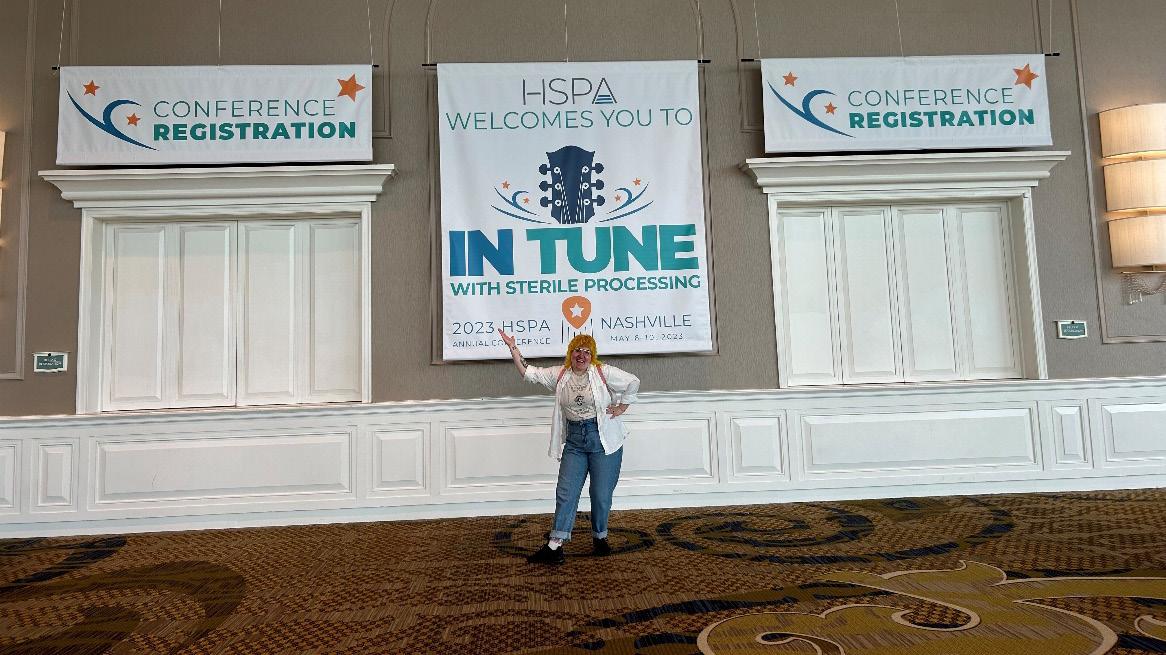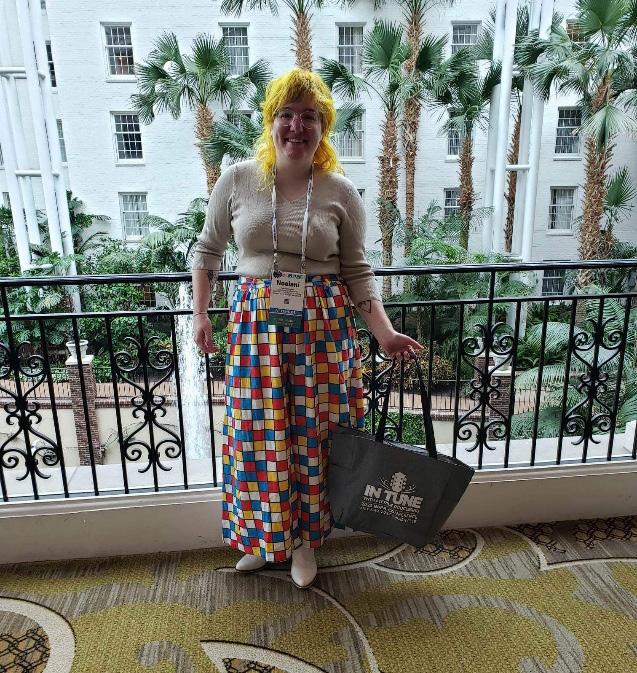
4 minute read
2023 HSPA Conference Recap
In May of 2023, I was able to attend the Healthcare Sterile Processing Association (HSPA) conference in Nashville, Tennessee. The HSPA is one of the largest certifying bodies for sterile processing technicians in the United States and offers four different certifications. I was lucky enough to be one of eleven recipients of HSPA’s conference scholarships to attend the conference and one of only two international recipients, the other being from Canada. Attending a large international conference was a fantastic opportunity to jump on the front line of new education and developments within the industry. The chance to network with people from all over the world and be able to bring those connections and things that I learned home to Aotearoa was amazing. There were 1200 attendees and ten different countries represented, including Brazil! The conference took place over four days with an array of hands-on labs Saturday afternoon and a wide variety of speaker sessions from Sunday to Wednesday. There were also trivia games in the evenings as well as a social on Sunday night and a full day to explore the large expo hall.
I currently work as a sterile processing technician at the University of Otago’s Faculty of Dentistry and I have been in the field on and off for the last ten years. In my time as a sterile processing technician, I have worked at a Magnetdesignated hospital, an ophthalmology clinic, and now large-scale dentistry. One of the things I was most looking forward to in attending such a large conference was the ability to network with people who work in similar teaching clinics, whether in hospitals or dental care.
I’m very interested in learning how staff in other sterile processing departments manage the unique challenges we face as teaching facilities. To this end, I attended a very interesting session by Jill Holdsworth, the Infection Prevention Manager at Emory Hospital Midtown a teaching hospital in Atlanta, Georgia. Her discussion, “Sterile Processing Beyond the Operating Room” was about the leaders of the Infection Prevention and Sterile Processing teams working together to create a continuum of care across all care settings. I found this particularly helpful as she really drove the point home about interdisciplinary cooperation and how we as a sterile processing unit bear responsibility to reach out and get to know the teams we work with (as do they!) whether that is OR staff or dental students and assistants. She discussed how they worked out interdisciplinary education sessions for OR/Clinic and SPD staff on the MIFUs for instruments that they were both handling, especially in cases for things like endoscopes which have quite specific MIFUs for point-of-use cleaning. From this I was able to start building ideas for things we could look at implementing within our own department, and how we could start looking into educational outreach.
This year, HSPA introduced a mentorship programme to the conference for the very first time. First-time attendees were able to sign up to be paired with a mentor who had attended before and who would be available to help them network as well as discuss their conference and career goals and recommend which sessions would be most beneficial for them to attend. I was paired with
Casey Czarnowski, a Sterile Processing Consultant from Minnesota. Casey is on the Board of Directors of the Minnesota HSPA chapter and also writes the educator’s update column in HSPA’s Process Magazine. Being a part of the mentorship program was such a benefit to the conference. Casey was able to introduce me to people who could answer my questions, point me in the right direction for which sessions would help me the most, and gave me a built-in conference buddy. I feel very lucky to have experienced my first conference this way.

Many of the sessions at the conference were about the reprocessing of flexible endoscopes as the standards in America (ANSI/AAMI as well as AORN guidelines) have just been updated. While the reprocessing of flexible endoscopes isn’t currently relevant under my purview, I still found that there was good information and advice I could take away about best practices in decontamination areas and handover communication with clinic staff. One of my favourite sessions was from Cori Ofstead, the President and CEO of Ofstead & Associates, Inc. in conjunction with Frank Daniels and Marie Brewer the Director of High-Level Disinfection and Sterilisation at VCU Health and the Regional Manager of Sterile Processing at Unity Point Health respectively. They presented a series of studies they did on splashes in decontam generated by manual cleaning and how the studies led them to adjust
References
their environments and practices, as well as run follow-up assessments on PPE.
Overall I’m very glad I attended the conference. I was worried I would feel out of place having shifted in recent years from hospital-based sterilising to dentistry, but what I found was the ability to create a niche for myself in the information even when it wasn’t one-to-one relevant to my current practice. From this experience, I have been able to bring home evidence-based practice to help back points that our SPD has been trying to make and ideas on how to action them. I also made friends and connections with people working in sterile processing departments all across America who I continue to share ideas with as we look forward to creating the future of our profession.


Ofstead CL, Hopkins KM, Daniels FE, Smart AG, Wetzler HP. Splash generation and droplet dispersal in a well-designed, centralized high-level disinfection unit. Am J Infect Control. 2022 Sep 15:S0196-6553(22)00629-0. doi: 10.1016/j. ajic.2022.08.016. Epub ahead of print. PMID: 36244924.
Ofstead CL, Hopkins KM, Smart AG, Brewer MK. Droplet dispersal in decontamination areas of instrument reprocessing suites. Am J Infect Control. 2022 Feb;50(2):126-132. doi: 10.1016/j.ajic.2021.10.023. Epub 2021 Dec 2. PMID: 34865859.





